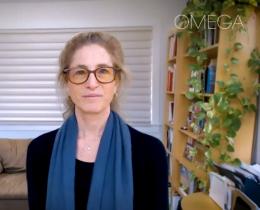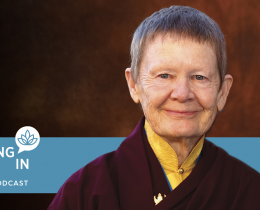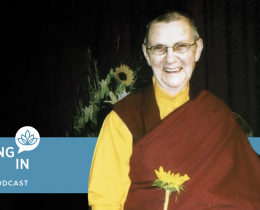Omega: Forgiving yourself can be just as hard as forgiving others. How can we find the self-compassion to forgive?
Tara: If you can’t forgive yourself, then bring to mind someone that can forgive you and draw on his or her openheartedness to open your own heart. Think of a grandmother, friend, or spiritual figure, and imagine them looking at you with pure love, forgiveness, and mercy. Put your hand on your heart and imagine that being’s love moving into your heart.
I like to tell this story. Imagine you are in the woods and you see a dog under a tree. You smile and go to pet this dog and it lurches at you, fangs bared and growling. You become angry at the dog and then you see its leg is caught in a trap. You shift again and go from being angry at the dog to having compassion for it.
Forgiving ourselves is having the wisdom to see our leg is in a trap. We are suffering, and we’re just not able to behave how we would like to right now. When we realize our leg, or someone else’s leg, is in a trap, we understand vulnerability and our heart opens.
Omega: What if we see ourselves in the trap but we still can’t stop feeling guilty?
Tara:It’s part of the human predicament that sometimes we can’t let go. In that case, we can say, “Okay, it’s like this right now.” We can accept that we can’t let go and go through the motions anyway. We can say, "Please may I forgive myself," or "It's okay sweetheart." Sometimes I simply use the words, "I'm sorry" and "I love you."
Just offering a kind message or gesture to ourselves can wake up a longing to connect to ourselves. It helps us access that deep part of us that is always there.
Omega: So you don’t have to figure anything out, you just have to accept what’s happening in the moment, even if what’s happening is that you can’t forgive yourself?
Tara: That's right. You can feel the pain of being stuck in the trap and you can actively offer compassion to yourself. Doing it actively (through words and touch) amplifies the compassion and completes a circuit of giving and receiving that the heart automatically responds to.
Omega: Is having self-compassion like knocking on the door of your true self and saying, “Hello, are you there?”
Tara: Exactly. That’s why you can make the gestures even when you don’t feel it, because compassion is already there and you’re just making yourself more available to it. Our natural state of being is openness, wakefulness, and love. We’re not trying to cultivate these qualities; we’re trying to realize we are those qualities. They’re already there and we’re trying to undo the obstacles that keep us from coming home to these essential elements of our being. Spiritual practice helps us remove these obstacles and relax back into what’s already here. Keep practicing and you will discover that loving presence is more the truth of who you are than any story of limitation and deficiency.



